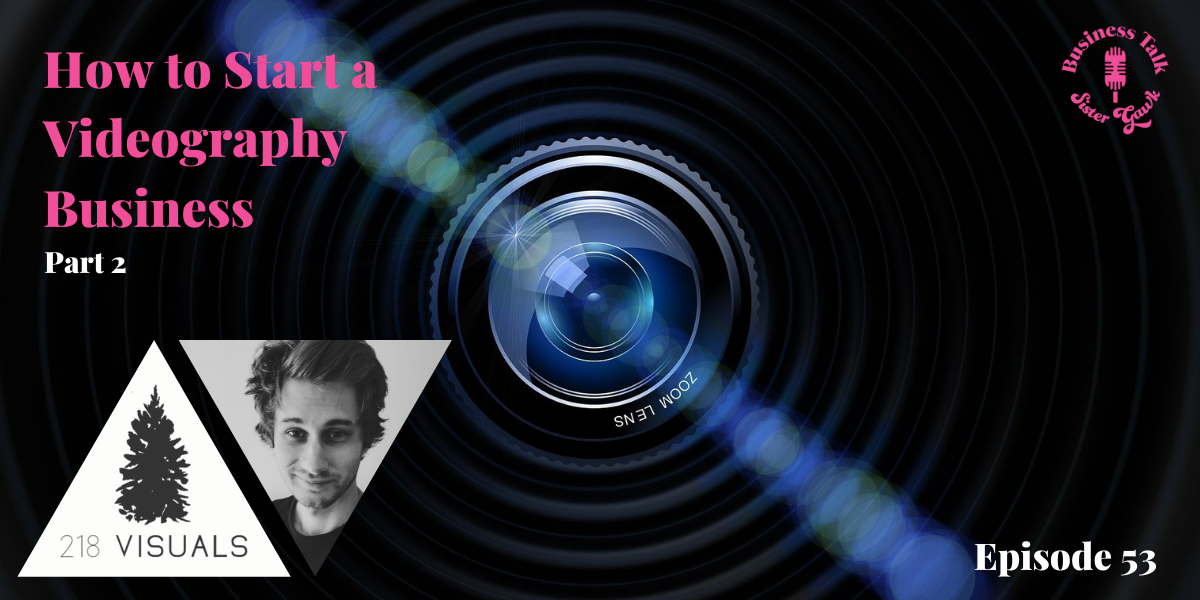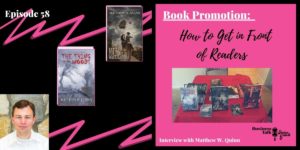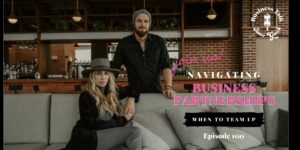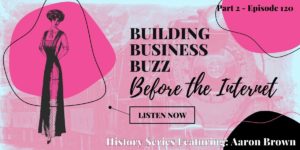Noah Penn, gives us details this week on navigating intellectual property, what his days look like as an entrepreneur in and out of busy season, and what advice he has for people just starting out in running a videography business. Don’t forget to check out the first part of our interview in episode 52!
Welcome to Business Talk Sister Gawk. I’m Bekkah! And I’m Ruthie! And today’s episode is part two of “How to Start a Videography Business”! With us we have Noah! If you didn’t hear our first episode, you need to go back and at least listen to the gawk portion with Noah because that was great! Okay, so I have some questions for you. We already went through “what do you do?” “why do you do it?” and we kind of started getting a little bit into “how do you do it?”, but I have some more questions for you on that. How would you describe your regular day? How do you do what you do?
What Does a Regular Day Look Like in a Videography Business?
Noah: That’s a good question. I think a lot of days are different depending on the time of year, honestly. For example, right now I’m mostly emailing and doing phone calls quite a bit with clients for next year for weddings. The offseason of weddings is mostly booking and just getting details straightened out and answering a lot of questions about how I can fit into their plans. You know that sort of thing. Right now it’s just a lot of communicating and sending out contracts and that sort of thing. In the summer, it’s a lot more just hands-on shooting, editing, a lot of driving, honestly. And sort of in the grind of I guess wedding video workflow.
Ruthie: Living off of Red Bull.
Noah: Exactly, yes. That’s a year-round thing thought.
Bekkah: When you meet with people, do they choose you based on like your personality a lot of times? When you meet with them and say, “This is what it can do?” or is it more based on the work that you’ve previously done?
Noah: That’s a good question a lot of times, honestly, I rarely meet with people initially. So when they book me, it’s entirely based around, initially at least, around portfolio. It’s a lot of emails. You know, once in a while if people are in the area in Duluth here I’ll meet with them, but a lot of people are booking me they live out of state or they’re down in the cities. So it’s pretty hard to get an initial consultation meeting or whatever, I don’t even know what you call that. They basically just see my portfolio and say, “Hey, that looks like something that we’re looking for!” and they contact me.
Is Having a Second Shooter Valuable in Being a Wedding Videographer?
Ruthie: All right, what do you think would be an advantage of having a second shooter. I know you do things pretty solo for now, but do you think that you would ever expand to doing that if you saw the value in it?
Noah: For sure. It’s something I think about more and more actually. I’ve never had a second shooter on a wedding shoot. For sure it would be helpful in a lot of ways. In terms of weddings would be helpful to just get different angles of something that’s happening. For example, a lot of couples do a first look at sort of mid-day or something. It’s the first time they see each other. It’s kind of a cool moment. I always really like it because it’s either usually really sweet or sometimes it’s just really funny.
People’s personalities just sort of come out during these first looks but the problem with having one camera and one lens is usually you get one person’s reaction to things and you don’t see both their faces. That’s one area where having a second shooter would be kind of nice. Just moments like that where things are happening in real-time and you can only capture so much from one angle. But on the flip side, more cameras, in my opinion, it’s just it’s more pressure. If I’m there, there’s probably a photographer there.
The photographer a lot of times does have a second shooter already so on a wedding day it’s like if people really want four cameras potentially on them at all times it seems kind of excessive. In a lot of spaces it’s just tight spaces too. If you’re indoors or whatever it wouldn’t really make sense to have a second shooter in a lot of environments.
What Equipment Should I Buy When Starting a Videography Business?
Ruthie: What would be some of the kind of base level equipment that you would need to have starting out? And then now when you’re looking back at when you first started think about, “I can’t believe I survived without this?” So starting out and then looking back now like, “I can’t live without this.”
Noah: Sure. Video is definitely a little bit more gear-based than just still photos would be. There are some things when you’re making videos that you do need that you wouldn’t really think about otherwise. Luckily, in terms of video cameras, the last 10 years or so have been insane with video technology. I mean you just look at the kind of videos you get with your cell phone now and it’s just insane the amount of processing that they can put into small packages so luckily the cameras that you would need really aren’t that expensive. I think I shot my first 25 weddings or so, the first year of weddings, I shot on a $400 camera maybe $500. Really wasn’t that expensive. The camera’s not really that expensive.
You probably need at a minimum a wide-angle lens and a more like telephoto lens. So camera, two or three lenses. You need some audio equipment too, which is kind of a whole separate thing. A lot of people don’t think about is the amount of cables and recorders and microphones that you’ll need to just like record stuff. Other than that, you do need a really nice computer which starting out that’s probably the biggest expense that you’ll have is a compute. Whether it’s a laptop or a desktop that will be able to handle high-quality videos.
But I’d say when I started out I probably had in total maybe $2,000 invested in all of my equipment that includes a computer as well. That’s extremely low, in my opinion. You can get going for pretty cheap and then as you start learning what the limitations are of less expensive cameras and less expensive lenses and that sort of thing you kind of realize what needs to get upgraded and what will actually help versus just end up costing money and not really help that much.
When to Upgrade Your Videography Equipment for Your Business
Bekkah: How often do you upgrade equipment?
Noah: Honestly, it’s kind of a continual process. If you talk to any photographer about it they’ll kind of probably laugh about that question too because it’s sort of the curse of acquiring gear all the time. There’s always going to be something that sparks your interest or they come out with a new version of a lens or whatever. I myself just basically replaced everything that I own over this last winter and upgraded all my camera, all my lenses, and everything and I switched over to Sony if that means anything to anyone. Honestly, it’s kind of a continual thing, finding the right balance between things but luckily cameras and lenses have a pretty good resale value so it might seem like, “Yeah, I just dropped like whatever $7,000 on new gear but I’m going to sell a lot of this other stuff that is going to make up for that.
How to Find Music for Videography Without Violating Intellectual Property
Bekkah: Tell us about intellectual property and what do you know about using other artists’ stuff for audio and those kind of things? How does that factor into how you put a video compilation together in your editing phase?
Noah: Yeah that’s a that’s a great question actually because the audio side of things is a lot trickier than I think a lot of people realize because of copyrights. A lot of people reach out to me and they’ll ask for a wedding video, but they say, “Hey, we’d like this – I don’t know Garth Brooks song or whatever in it,” and I have to sort of explain to them, “Hey, actually if you want to use that song, if you want to pay me to make a video using that song, I have to go out and get a license for it and the license that song, if it’s a really popular song it’s probably gonna cost like $20,000, $30,000 dollars or something like that, so it’s probably not something we’re able to do.”
That piece I sort of have to navigate with people sometimes. I do pay for licensing, that’s one of my biggest business expenses actually is paying for music licensing for wedding videos. It’s sort of like the more you end up paying the higher quality music you get access to. That’s one thing that I take a little bit of pride in is being a musician, I’m sort of a little bit pickier about music. I would like to think that the music I pick really represents the couple well and also sort of fits the 218 Visuals brand well I guess.
I’d say audio copyrights is the biggest thing where I run into that. I’ve even had some cases where I’ve purchased a license for a song, I can think of one example was I bought a license to use Hillsong’s Oceans in a wedding video and as soon as I posted it, Facebook and Instagram took it down immediately. They wouldn’t even let me post it and I had to sort of file a claim that said, “Well, hey, actually I do have a written license from Hillsong.” I forget who their publishing company is but so it’s sort of a messy world and I think a lot of people don’t realize that if you use music that you don’t have rights to it will probably just get removed entirely. Which is kind of a bummer.
Where to Find Good Songs for a Videography Business
Ruthie: What are some good tools for finding songs that you use?
Noah: Because it’s such a common problem, luckily there are websites that will sort of tailor their music selection to filmmakers and videographers. For example, the main one that I use is called Musicbed. They’re this giant catalog of music. Mostly unknown artists that you wouldn’t see on the radio definitely. Although there are some, for example, that’s where I got the license to Oceans and they have stuff like Ben Rector’s on there and that sort of thing. But for the most part, it’s people that are maybe on Spotify but that you hadn’t heard before.
For me, I think that’s great especially for wedding videos. I don’t know if people really want their wedding day attached to a Taylor Swift song or something I think initially that probably seems like a good idea, but I think you want a little bit more of a personal or unique touch to the music. There are tons of great resources like Musicbed, Soundstripe. There’s another one Artlist. There are probably a solid half dozen or a dozen really solid websites that you can pay to have access to.
Ruthie: Nice!
Bekkah: I’m just saying right now, I strongly regret not having a Taylor Swift song for my wedding song.. I’m just kidding.
Noah: Strike that from the record then.
Ruthie: Life long regret of Bekkah’s. Okay so let’s get into some of the more technical financial pieces. Tell me about traveling and gas and how you work that into your cost that you bill out to a client.
Noah: For weddings and other video projects that are out of town definitely charge for travel. I don’t know if that’s a suggestion or whatever but you definitely should be charging if you’re taking your time to drive somewhere and bring all your gear and a car and gas and all that stuff. I think about in terms of how many hours is it away from me. I don’t know if I have an exact cut off for when I’ll charge for a hotel room exactly. That sort of depends on, I don’t know.
I guess maybe I’d say the number in my head right now is like if it’s more than three hours away from my house I’m probably going to charge another however much a hotel room is in the area if it’s something that’s going to keep me there late like a wedding for example or if it’s like a two-day project. But that’s sort of like a flat rate too so I don’t really charge the exact number of miles for example. Sort of a flat travel fee that goes up for every hour or so that it is away from me and I’m sure there are different and may be better ways of doing that but in general, I try to keep the business side of things as simplified as I can because I am more of I don’t know scatterbrained, creative minded, sort of videographer rather than a really business-oriented one. If I’m just being honest that’s probably where I land.
How to Package Your Files For a Videography Business?
Bekkah: That’s pretty much most creative people, in general, with business so. When you package your video files do you include the b-roll in that too or is that extra? How do you bring your final product to people?
Noah: Yeah I don’t really normally give people the raw footage of everything that I shot that day, if that’s what you’re asking. Some people have asked for that and I’m usually able to talk them out of it. It gets into a lot of technical stuff with video codecs and color spaces and all this stuff but the reality is even if I gave you all this stuff, number one your computer wouldn’t even be able to play it. My computer can’t even play the videos that I shoot unless I import them first into Adobe Premiere. So the raw footage for most people is completely useless. I’m usually able to be like, “Well, you’re probably not going to use it anyways.”
I don’t give people everything but I do give quite a bit of I don’t call it “material” at least for a wedding day. There’s the highlights video, which is sort of the really cool cinematic thing with background music and all the fun cool shots of the day. It’s all the stuff that I advertise on my Instagram and it’s on my website and stuff. But other than that separately I send recordings of things, by that I mean a full recording of the ceremony, of the speeches, of the first dances of the day that happen. Then there’s some other little I don’t know what you’d call them, “vignettes” or whatever. Just like little moments of the day that I send too.
I send most of that just privately to people because I don’t think a lot of people want their best man’s wedding toast or whatever just public on Youtube or like their wedding ceremony vows. A lot of people want that kind of more private so that is just sort of at their discretion. If they want to share that but I keep that private on my end at least. There have been some really funny speeches though that like, I don’t even know these people and I’m just like crying laughing. That’s such a hidden surprise when someone’s just hilarious you know it’s just like, “Oh, man this is great. I’m like being entertained and I’m getting paid right now!”
Ruthie: There you go!
Noah: In terms of like delivery it’s all online. I don’t do any sort of DVDs. I used to offer a USB option. If someone was really intent on that I would do it for them but people just download them and put them on their own USB drive. It’s just not something I care to do for people, honestly, because it just doesn’t make sense.
How to Overcome Insecurity in Starting a Videography Business
Ruthie: When you first started out how did you kind of overcome the insecurity of doing something new and stepping out?
Noah: I think you just have to accept the fact that you’re just gonna suck for a while. That’s what I say a lot with people about music too because I’m a guitarist. So a lot people ask me for guitar tips wherever I’m just like, “Honestly, you have to learn to just suck. You’re just not gonna be good at it for the first whatever but it’s the process of sort of powering through that and the desire to get better and improve and compare your work to other people.” You just have to go through that to get better at things. I think that applies to video, it applies music and I think it just applies to anything new that you try out. Obviously, the first time you do something is not going to be as good as when you’ve mastered something.
Ruthie: Like watching the first episode of any show ever.
Noah: Right, yeah! The characters aren’t developed. It’s a little awkward but then you get to season three and it’s like we’re rolling. Just go for it I’d say.
What Advice Do You Have For Starting a Videography Business?
Bekkah: Looking back what are things that you would tell yourself to do differently or what advice would you give to someone who’s looking to start out?
Noah: Yeah that’s a great question. I think some advice that I would give to someone just starting out and that I would have told myself three years ago would just be to be more confident in your abilities to do something. When you’re starting out in video, honestly, especially a wedding you feel a lot of pressure. I don’t really feel that well anymore because I’ve done you know close to 100 weddings now, but when you start out you feel so much pressure and that sort of, at least for me, I think caused me to shrink in some scenarios.
I didn’t want to ask people to like redo something or I didn’t want to be in the way of the wedding I think I sacrificed some really cool shots where I could have been closer but I just didn’t want to block people’s view and that sort of thing. I think just be confident in what you’re doing and just realize that they hired you to be the guy or the girl at this – if it’s not a wedding it’s like a video shoot or a commercial shoot or whatever – just to own that role of being in charge of making this video. That’s something I think I definitely grew into but at the start, I was definitely a little bit more passive I would say in making the videos and directing things. That’s some advice that I’d give to someone just starting out. Definitely just own the role of creating the video.
Ruthie: Yeah! That’s awesome. Well, this has been so good getting to kind of pick your brain and learn about what you do and how other people can do that too! So thank you, Noah, for joining us! He’s from 218 Visuals which you can follow on Instagram do you want to say your website URL.
Noah: Yeah I hope what I said was useful! My Instagram is @218Visuals and the website’s the same. It’s just 218visuals.com. That’s me!




